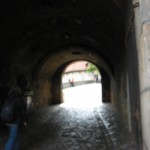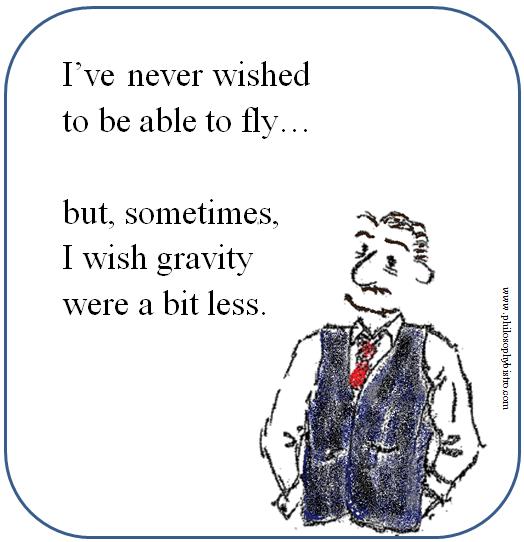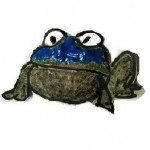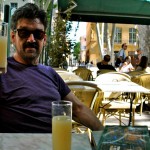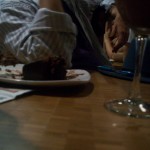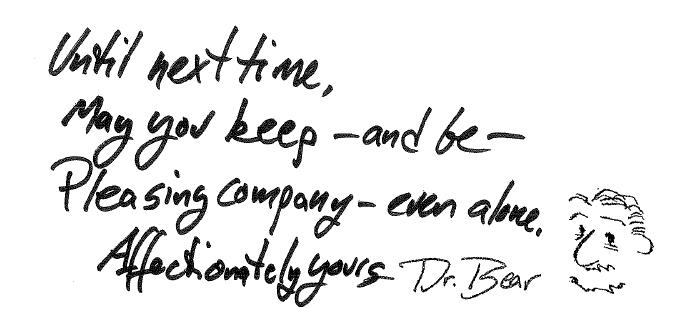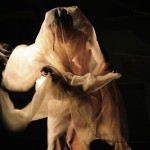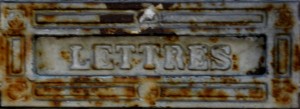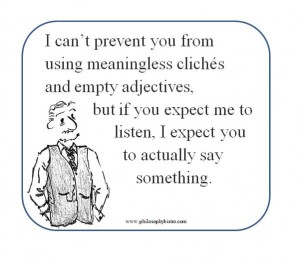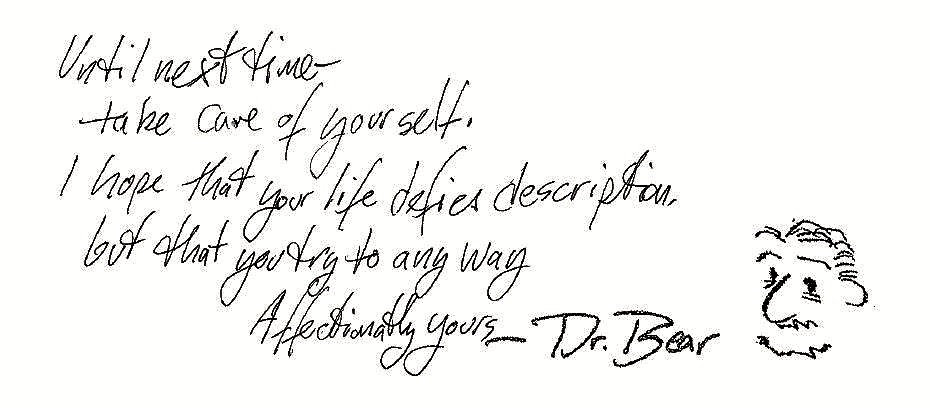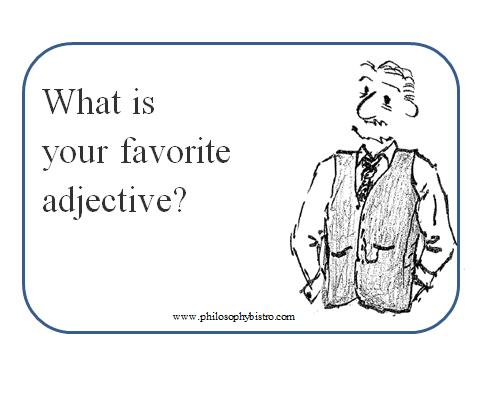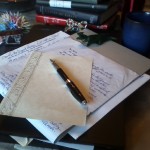 My dear reader,
My dear reader,
I am writing this letter to you to explain why I write letters. This year, I have hand-written more than 100 letters, postcards, thank you notes and other cards. In spite of this…
(Wode Toad is telling me to stop whining and feeling sorry for myself, and to get on with it. He is right; in the past few weeks, I received lovely letters and cards from my daughter, from Zack, from Kirsten, from Katy, from my mother-in-law, and even a package from Maeve & Kathy.)
and to get on with it. He is right; in the past few weeks, I received lovely letters and cards from my daughter, from Zack, from Kirsten, from Katy, from my mother-in-law, and even a package from Maeve & Kathy.)
I think there is something important about writing letters. I think it is a more genuine and authentic way of communicating than other ways of “messaging.” There is an investment to writing, and a special magic and joy to receiving a letter.
In 1935, the philosopher Walter Benjamin wrote a famous essay entitled “The Work of Art in the Age of Mechanical Reproduction.” He explores how being reproduced changes the nature of a work of art. Of course, art has always been copied, but the possibility of large-scale mechanical reproduction and the development of forms of art such as photography and film which specifically rely upon this ability change how exactly we interact with art. Benjamin is writing as a child of the 19th century in the earlier 20th century; he is reacting to large-scale mechanical reproduction becoming more and more common, but not yet ubiquitous and inescapable.
For Benjamin, there is something that is lost in the transition between an original work of art and a reproduction, and, in fact, with reproduced art there is not even a clear distinction of “original.” Although we can speak of “Master copies,” there is no real way in which the first copy of a film has any sort of privilege over copies. Benjamin calls that which is lacking in reproductions an “aura.” This aura included such things as a certain authority, an ability to stand back and consider this one artifact as the authoritative version of this work; in addition to this, a work of art is located within a specific time and place having been brought to that time and place through a specific history.
Furthermore, it is located–enmeshed–within a specific tradition. The mechanical reproduction, by contrast, floats independently and unattached. Although there is only one original work, it is open to perspective, allowing its few viewers to walk around it and see it from several sides, standing face to face with the work of art, reacting to it and–in the case of performed art–being reacted to. By contrast, mechanically reproduced art forces its mass viewers to assume a certain viewpoint–that of the camera operator or editor. While the observer is absorbed in the original work of art, the purpose of the mass-produced reproduction is to distract.
One of the biggest changes in perception in the age of mechanical reproduction is that reproduction by sheer volume will eventually become the norm, and at one point we will not be able to even see a difference. What Benjamin didn’t foresee was the primacy of mass media, that at some point mechanical reproductions would not only have primacy over original, unique art, but that at some point reproduction would come to seem more real than the reality it represented and reproduced.
I am not entirely sure I agree with Benjamin, I love cinema and photography as art forms, and am unwilling to write them off. I definitely think he attributes a little too much to the mysterious aura of the art object–even using the language of religious mysticism and magic, but there is something different to created art as opposed to reproduced art. I have seen many of the great painting & sculptures that I also saw reproduced as little pictures in my textbooks, but also as posters and prints. The magic–and I really cannot think of another adequate word–of standing before Rembrandt’s The Night Watch in Amsterdam of Van Gogh’s Starry Night in New York or within an actual Cathedral is inexpressible. I am not sure what the aura of the authentic work is, but there definitely is something. Performed art can be made more perfect through multiple takes and editing, but there is something raw and beautiful that makes a live musical or theatrical performance so wonderful. I have a recording of Townes Van Zandt singing “If I Needed You.” I also saw him perform it live. The recording is actually better–his voice was pretty much shot by the time I saw him in 1990–but there was something about hearing Townes himself sing it, 100 or so feet away, under the July stars in Nashville. There is an aura, an authenticity, to an original work shared directly.
If I needed you would you come to me, Would you come to me, and ease my pain? If you needed me I would come to you I’d swim the seas for to ease your pain.
That is why I like to send hand written letters. Putting my words here onto the glowing screen sets them into an inorganic detached place, a place without history or 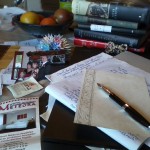 context. Even as watch myself type them, the words become as indifferent to me as an article on Wikipedia. As you read them, you are reading them at a remove from me. The paper of a letter does not remove my words from me the way the screen does. They remain mine (and, given the nature of my handwriting, clearly, uniquely, mine), and when you read my letter they are still my writing, my marks, my words, but in your hand: they are now ours. Like the bread I have brought to your house, we are now sharing.
context. Even as watch myself type them, the words become as indifferent to me as an article on Wikipedia. As you read them, you are reading them at a remove from me. The paper of a letter does not remove my words from me the way the screen does. They remain mine (and, given the nature of my handwriting, clearly, uniquely, mine), and when you read my letter they are still my writing, my marks, my words, but in your hand: they are now ours. Like the bread I have brought to your house, we are now sharing.
Where is the text I sent you? To whom does it belong? Where is the note you sent me on Facebook or in an email or by text? It might be in the cloud or on a mainframe somewhere, or on your phone, but are those real places? Can you put a text in your shirt pocket next to your heart, or keep it under your pillow?
Although we strive to live authentic lives in this 21st Century world, we have given up the very things that allow us to be authentic: knowing the person who grew our food, or even the person from whom we buy it, having our food reproduced for us rather than shaping it and making it ourselves, and investing ourselves (in my case, often a little blood) in our food, sewing our own clothes or working on our own houses and yards. In our jobs we are simply tools of mechanical reproduction, and in our lived lives we are allowing ourselves to become works of mechanical reproduction.
Furthermore, most of us are losing the ability to even recognize the difference: we do not know what it would be like to grow our own food, and we do not even recognize what it looks like before it is our food–on the vine or on the hoof. We do not know how to talk to a vendor at a road side stand or a butcher. Many of us do not know–or have only a faint childhood memory or the reminiscences of our parents and grandparents–what we have lost by eating “prepared” food rather than slow food cooked from scratch. Many of us have never owned an article of clothing that is unique, which could not be worn by hundreds, even thousands of others who went shopping around the same time. Soon, we might no longer remember what it felt like to connect with a friend–or even a stranger–in genuine conversation, or, if we do, it will be a distant memory, something else we experimented with when we were in college but have left behind.
The last hope of authenticity is also the first foundation of being human: being in touch with our fellow human beings. And so, to be authentic, we must try to restore authentic modes of staying in touch: genuine face to face (or side by side) conversations, eye contact and common courtesy, playful interaction, and open, honest conversation.
Since we live in a world in which we are increasingly separated from 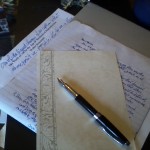 our friends and family, we must cultivate ways of staying in touch which have the same aura of authenticity. That, my dear reader, is why I still write letters by hand. Yes, an email, a Facebook post, a tweet, even an abrev’d text can have the same touching quality as a letter or even a heart to heart face to face, but if we never write and seldom talk, it is more likely that all our interactions will become inane twitter, or even the interpreted signage of Instagram, the borrowed scrapbooks of Pinterest, the flowing re-posts of tumblr, or the ephemeral images of Snapchat, instead of becoming more like conversations.
our friends and family, we must cultivate ways of staying in touch which have the same aura of authenticity. That, my dear reader, is why I still write letters by hand. Yes, an email, a Facebook post, a tweet, even an abrev’d text can have the same touching quality as a letter or even a heart to heart face to face, but if we never write and seldom talk, it is more likely that all our interactions will become inane twitter, or even the interpreted signage of Instagram, the borrowed scrapbooks of Pinterest, the flowing re-posts of tumblr, or the ephemeral images of Snapchat, instead of becoming more like conversations.
If, however, we continue to write, to take the time to form our own words and to send them, perhaps that aura of authenticity will inform even our humblest text.
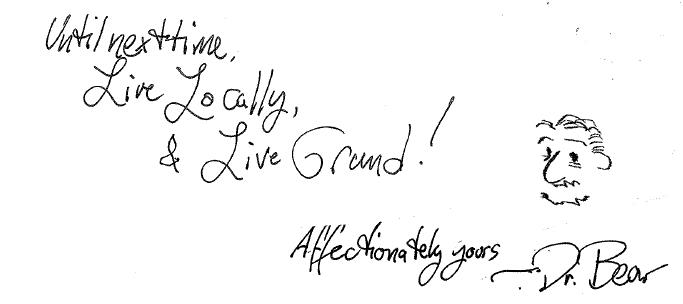
PS: an audio version of this is available here.
Like this:
Like Loading...


